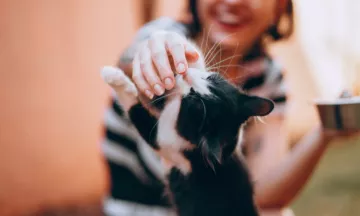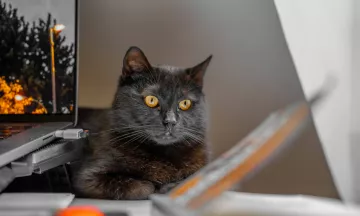King Charles Cavalier Spaniel: Breed Spotlight

King Charles Cavalier Facts
- Breed name: King Charles Cavalier Spaniel
- Classification: Toy breed
- Size: Small
- Coat: Medium to long, silky
- Colour: Various colour combinations, most commonly tricolour (black, white, and tan), Blenheim (chestnut and white), black and tan, and ruby (solid red).
- Personality: Affectionate, gentle, friendly
- Family-friendly: Yes
- Friendly with other pets: Yes
King Charles Cavalier Background
The King Charles Cavalier Spaniel is a charming and lovable toy breed that has captured the hearts of dog enthusiasts worldwide. These popular dogs have a distinctly regal appearance, friendly demeanour, and silky coats. In this article, we'll explore everything you need to know about King Charles Cavaliers.
Origin and History
King Charles Cavaliers have a long and royal history as lapdogs and cherished companions. The breed originally got its name from King Charles II of England, who famously adored these dogs.
Following the reign of King Charles II, the English Monarchy favoured the breed for centuries. Outside England, European royalty and aristocracy also adored these dogs for their sweet nature and ability to keep laps warm.
Today, the King Charles Cavalier Spaniel remains a beloved family pet, thanks to their gentle disposition and affectionate nature. They make excellent companions for families, singles, and seniors alike.

Physical Appearance
The King Charles Cavalier Spaniel is a small breed with a graceful and well-proportioned body. Their most striking feature is their silky coat. This coat comes in various colour combinations, including tricolour, Blenheim, black and tan, and ruby. They have expressive, large, dark eyes that exude warmth and kindness, and their ears are long and feathered.
Cavaliers have a soft, wavy or straight tail and a gentle expression that makes them highly endearing. Their compact size and sweet appearance make them a favourite among those seeking a small and charming canine companion.
King Charles Cavalier Behaviour and Temperament
King Charles Cavaliers are renowned for their friendly and affectionate personalities. They are social butterflies, getting along well with people of all ages and other pets. As such, they thrive on human interaction and being close to their owners. For this reason, many people nickname this breed as 'velcro dogs'
They are gentle and rarely aggressive, making them an excellent choice for families with children. However, like all dogs, early socialisation and training are essential to ensure they grow into well-mannered adults. Cavaliers are eager to please and respond well to positive reinforcement-based training methods.

Training and Exercising King Charles Cavaliers
Training a King Charles Cavalier involves patience, consistency, and positive reinforcement. These dogs are eager to please, so praise and treats go a long way in encouraging good behaviour. Early training and socialisation are crucial to ensure they are well-adjusted and polite around other dogs and people.
While Cavaliers are a small breed, they still require regular exercise to stay happy and healthy. Daily walks, playtime, and mental stimulation through interactive toys and games are essential for their well-being. They may not need as much exercise as larger breeds, but they do enjoy an active lifestyle.
Living with a King Charles Cavalier
Living with a King Charles Cavalier is like having a loyal and affectionate friend by your side every day. These dogs thrive on companionship and want to involve themselves in all your daily activities. Whether you're a family, a single person, or a retiree, a Cavalier can make an excellent addition to your home.
As with any dog, it's essential to understand your Cavalier's specific needs and quirks. Providing love, attention, and proper care will ensure a happy and healthy life for your furry friend.
King Charles Cavalier Health
King Charles Cavaliers are generally healthy dogs, but like all breeds, they can be prone to certain health issues. Here are some common health problems seen in King Charles Cavaliers:
- Heart Conditions: Cavaliers are predisposed to heart-related issues, particularly mitral valve disease (MVD).
- Syringomyelia (SM): This is a painful condition that affects the brain and spine, commonly found in the breed.
- Ear Problems: Cavaliers are prone to ear infections because of their floppy ears. As such, owners will need to clean their ears frequently.
- Eye Conditions: Some Cavaliers can develop eye problems, including cataracts and retinal issues.
- Luxating Patella: This orthopedic issue can lead to lameness and discomfort.
Regular veterinary check-ups, a balanced diet, and a loving home environment can help reduce the risk of these health problems. Responsible breeding practices are also essential to maintain the breed's health.

King Charles Cavalier Grooming
Grooming a King Charles Cavalier involves regular attention to its silky coat and overall cleanliness. Their long ears require particular care to prevent infections. Here are some grooming tips:
- Brush their coat several times a week to prevent mats and tangles.
- Bathe them as needed, typically every few weeks.
- Clean their ears regularly and check for signs of infection.
- Brush their teeth to maintain good oral health.
- Trim their nails as often as required.
Introduce grooming routines from a young age to make the process enjoyable and stress-free for both you and your Cavalier.
The King Charles Cavalier Spaniel is a delightful and loving companion that can bring joy to any household. Their charming personality, royal history, and sweet nature make them a treasured addition to families and individuals alike. Whether you're a dog lover or a potential Cavalier owner, these wonderful dogs are sure to capture your heart.
Do you need a dog sitter to look after your King Charles Cavelier while you are on holiday? Head to Pawshake now to find a caring, responsible dog sitter near you.





